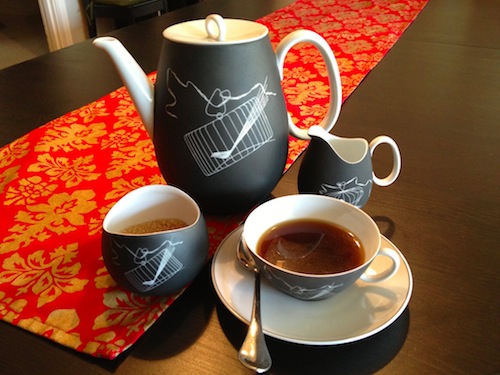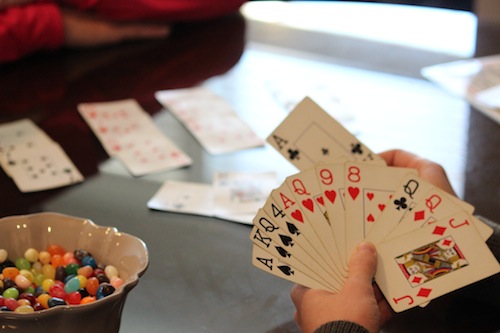 Photo: Vicki Gilbreath
Photo: Vicki Gilbreath
1. The Last Game of Bridge
The card table sat in my mother’s driveway, surrounded by boxes of family heirlooms: books, sculptures, three sets of china, the family silver, small appliances and kitchen tools. My mother was the second of three daughters sitting around the table, their mother playing dealer and making sure, as usual, that everyone followed the rules of bidding. The grown grandchildren sat apart, as we had when we were young, not speaking until spoken to lest we distract the players. Surrounded by our family culture, we watched the game unfold.
Grandma opened the bidding with a convenient minor — she and Pa were downsizing again, and this move required a drastic step in her lifelong practice of living only with what she would use or enjoy. (That military wife enjoyed the slash and burn of a move.) But no one wanted to take the bid, and no one wanted to move to game. Not even the stoic daughters could find a suitable responding bid. The divvying, as we came to call it, was like two no-trump: the players had too many points not to play, but no one wanted to name the real major (dementia, which Grandma was already showing signs of inheriting from her mother), and no one wanted to take the lead.
Nevertheless, we played because of who set the table. I think my grandmother wanted to know that the things that mattered most as family heirlooms went peacefully and equitably among her daughters and grandchildren. She wanted to know that we all knew what counted as an heirloom. She wanted to know that we all knew the story of who we are as a people together.
My prize from the divvying was Grandma’s set of Rosenthal “Papageno” china purchased when the family was stationed in Germany. My sister got the yellow-brown floral “Buttercup” Spode with fluted edges, but the Rosenthal is matte black with stylized birdcages; this is the difference between us. The delicate edges of my bowls and cups seem so easy to chip that I often hesitate to use the set, but Grandma did not divvy the Rosenthal to me so that I could look at the coffee carafe in my china cabinet and reminisce.
Grandma wore a certain kind of slacks in her later years — pants with proven longevity as well as practicality of style (classic) and fabric (no-iron), which means she was glad to pay what they cost (from Nordstrom’s). At my grandfather’s second retirement from the Air Force, B Dalton transferred them from Texas to southern California so that Grandma could become the first manager of what was then the largest B Dalton store in California. All those years of managing her home translated into business savvy at an age when most companies do not want to invest in white-haired ladies. She kept mental track of her inventory like she kept track of trump. She would send us boxes of remaindered books after sale seasons — a practical gift intended for diligence and exploration.
She divvied the Rosenthal to me so that I would use it. So I do.
 Photo: Micah Strange
Photo: Micah Strange
2. Her Face in My Mirror
My sister has inherited my grandmother’s bridge instincts, but not her adherence to the rules — everyone always wants to be Emily’s partner because the cards follow her so often, but she bids above her counting if the cards look good, and she seems able to make almost any bid. The saying goes that the cards run with the bathtub (partners who sit across from one another in the same direction of the bathtub in the house where they play will be dealt the favorable cards), but we say the cards run with Emily.
We play at holidays, our local foursome — my mother, my older aunt, my sister, and me. We evoke my grandmother’s favorite bridge-isms, like “Eight ever, nine never,” and “Cross trump is a beautiful thing,” and “Finesse your partner, skip to my Lou.” We smile to remember her saying those things, though my sister and I played very little with the legend; once old enough to learn the game, we could only share the fourth spot whenever our younger aunt was not in town. The women of the family always obeyed the unspoken hierarchy, which had little to do with felt superiority and everything to do with excellence of gameplay. Now we four exclude the men again and send the children off to play elsewhere quietly.
Though I am the least adept with numbers, I have become all-time scorekeeper for our foursome. And I watch the faces of these women for signs of our shared matriarch — my aunt squints and blinks at her cards, my mother calls for quiet and looks at no one as she plays out a won bid. They are gray going silver, just like their mother before them. My mother especially seems destined for the same striking white hair that her mother had all the years I ever knew her.
When you look at my mother, you see me in twenty-five years. Every child bears at least some resemblance to her biological family, but I am like a clone watching my older self age; I look just like my mother and see my own silver-white hairs appearing more frequently now than even a few months ago. A legacy in the crown of gray, my physical connection to my mother and grandmother — I can see at a glance and remember instantly my grandmother’s nose, hair, slacks, squint, sniff. But my mother saw too in a recent photograph my physical resemblance to my paternal grandmother — the angle at which I stood, that holding of the elbow. I am the women who made me.
3. The Loneliness of Likeness Photo: Vicki GilbreathThe Rosenthal in my china cabinet, the white hair, the game of bridge and the ritual of repeating Grandma’s words, the recipe cards my other grandmother wrote for me, the crook of the elbow, the notions — the stuff I inherit carries the weight of my identity. I am coming into my heritage through the acquisition of things and through the aging of my body.
Photo: Vicki GilbreathThe Rosenthal in my china cabinet, the white hair, the game of bridge and the ritual of repeating Grandma’s words, the recipe cards my other grandmother wrote for me, the crook of the elbow, the notions — the stuff I inherit carries the weight of my identity. I am coming into my heritage through the acquisition of things and through the aging of my body.
Meanwhile, my husband and I are on the journey of adoption, ready for our third child to enter our family any day now, and I wonder how our family’s sense of heritage will change. I study the stuff of my inheritance accidentally in every mirror and in every setting of the table, but I call them heirlooms because I inherit them from women I know and love. I cannot help but bear the silver hair of my grandmother, and by some indiscernible mix of nature and nurture, I love the game of bridge. Most likely, even in an open adoption, my non-biological children will not so easily see themselves growing into the people whose genetics made them. Spliced into us, they will stand to inherit much more — both the biological nature of their first family and the adopted nurture of their forever family — but through a sharp loss.
At the end of the divvying, I brought home pieces of family identity that I hope to enjoy for many years, but when I look back on that day, I see it as the beginning of my grandmother’s slow decline into dementia. My sister and I packed up similar storied objects from our father’s side of the family after we catalogued that grandmother’s belongings — she did not preside over any divvying, nor would she have wanted to do so. Thus, my house now seems full of objects that I inherited through loss — the loss of grandparents. This is the nature of inheritance. So too, we later generations become the proprietors of family recipes and medical histories — the markers of heritage, or personal identity rooted in story.
But my adopted children won’t access their heritage in exactly the same way. They won’t grow into my grandmother’s silver hair. They can’t. Even if their hair goes that same hue, it will be because someone else gave them the genes for it. Maybe they will know those people, or maybe they won’t. Maybe they will one day possess, as I do, artifacts of the people who bore them — a tin of buttons, their biological father’s baby shoes preserved all those years, a cookbook — or maybe they won’t. Even so, they probably will not have, as I do, the memory of the way that grandmother’s fingers wrinkled as she dealt a hand of cards. They will have dear memories of making and finding and ritualizing with women who will love them without distinction, but I expect those memories to do a different work in our next children than similar memories do in my own mind. Nevertheless, we will all watch ourselves grow into the shapes and manners of my grandmothers. I see their hands reaching out from my arms as I make the fruitcake every year, and we may yet see the crooks of their elbows around the tables for many years to come.
We will have the privilege and responsibility of crafting fresh stories — for our next children and for our ever-changing family. My husband and I especially will have the privilege of guarding and shaping identity, perhaps even inventing meaningful heirlooms to carry our unique stories forward. And we will have the responsibility of watchfulness as we help our children through adoption name the loss they may see more sharply as they grow older, even as I more sharply see my growing likeness in the mirror. Pain will be a part of their story in a way that it will never be a part of mine except through the glorious gift of parenting them. And that’s the gospel. That’s the incarnation — for Jesus is God with us, made like His brothers in every respect.
Our adopted children will have a distinct heritage that will look more like a spliced plant than a direct lineage. A hybrid of genetic inevitabilities and adopted potentialities. They will carry in their faces the signs of their parents and grandparents. They will signal back, though they may not see the resemblances as quickly or easily as I do in my mirror. And they will, if I have anything to say about it, make my grandmother’s fruitcake and play bridge and inherit the Rosenthal. They will, of course, change our stories forever and for the good.
 Photo: Vicki Gilbreath
Photo: Vicki Gilbreath
Jennifer Strange is the assistant editor of the Art House America Blog. Also a wife, mother, writer, editor, Twitterer, bridge player, annual maker of fruitcake. She contributes regularly to this blog, and her poems have appeared recently in The Other Journal and The Southern Poetry Anthology, Volume IV: Louisiana published by Texas Review Press.















